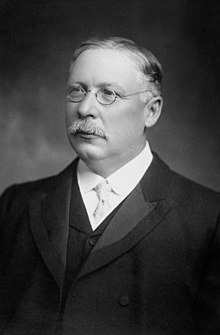Bible Knowledge Graph
Alexander C. Rutherford
- Entity ID:
- alexander-c-rutherford
- Long Name:
- Rutherford, Alexander Cameron, 1857-1941
- Short Name:
- Alexander C. Rutherford
- Disambiguation String:
- Canadian lawyer, politician, first Premier of Alberta
- Entity Type:
- person
- Entity Subtype:
- author
-

- Wikipedia
- Summary:
-
Alexander Cameron Rutherford, KC (February 2, 1857 – June 11, 1941) was a Canadian lawyer and politician who served as the first Premier of Alberta from 1905 to 1910. Born in Ormond, Ontario, he studied and practised law in Ottawa before moving with his family to the Northwest Territories in 1895. Here he began his political career, winning in his third attempt a seat in the Legislative Assembly of the Northwest Territories. In keeping with the territorial custom Rutherford ran as an independent, though he generally supported the territorial administration of Premier Frederick W. A. G. Haultain. At the federal level, however, Rutherford was a Liberal.
In 1905, Alberta Lieutenant Governor George Bulyea asked Rutherford to form the new province's first government. As Premier, his first task was to win a workable majority in the Legislative Assembly of Alberta, which he did in the 1905 provincial election. His second was to provide the apparatus of provincial government: his government established everything from speed limits to a provincial court system. The legislature also controversially, and with Rutherford's support, selected Edmonton over rival Calgary as the provincial capital. Calgarians' bruised feelings were not salved when the government located the University of Alberta, a project dear to the Premier's heart, in his hometown of Strathcona, just across the North Saskatchewan River from Edmonton.
The government was faced with labour unrest in the coal mining industry, which it resolved by establishing a commission to examine the problem. It also set up a provincial government telephone network—Alberta Government Telephones—at great expense, and tried to encourage the development of new railways. It was in pursuit of this last objective that the Rutherford government found itself embroiled in scandal. Early in 1910, William Henry Cushing's resignation as Minister of Public Works precipitated the Alberta and Great Waterways Railway scandal, which turned many of Rutherford's Liberals against his government. Eventually, pressure from many party figures forced Rutherford to resign. He kept his seat in the legislature after resigning as premier, but was defeated in the 1913 election by Conservative Herbert Crawford.
After leaving politics, Rutherford continued his law practice and his involvement with a wide range of community groups. Most importantly, he became chancellor of the University of Alberta, whose earlier founding had been a personal project. He died of a heart attack June 11, 1941. A University of Alberta library, an Edmonton elementary school, and Jasper National Park's Mount Rutherford are named in his honour. Additionally, his home, Rutherford House, was opened as a museum in 1973.
- Viaf ID:
- 13410633
- DB Pedia ID:
- Alexander_Cameron_Rutherford
- Biblical Status:
- Not Biblical
- Is An Individual:
- Yes
- Is Published:
- Yes
- Birth Date:
- February 2, 1857
- Death Date:
- June 11, 1941
- Occupation:
- Lawyer, politician, first Premier of Alberta
- Nationality:
- Canadian
- Works:
